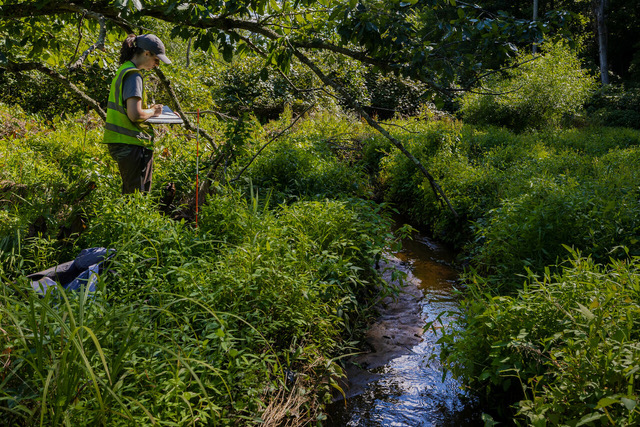Center Spotlights
CALS Research Monthly
Researcher tending to plants at Tidewater AREC. Photo by Jacob Barney for Virginia Tech.

School of Plant and Environmental Sciences advances research, education across Virginia
Six research priority hubs provide students with direct access to practical experience while meeting stakeholder needs
By Julie Shlisky
The School of Plant and Environmental Sciences, home to more than 100 graduate students and over 80 faculty members, maintains extensive partnerships throughout the commonwealth to educate future agricultural professionals, develop innovative technologies, and deliver science-based solutions through extension programming.
The school focuses on six research priority areas aligned with undergraduate majors, providing students with direct access to practical experience. Graduates are equipped to address Virginia’s agricultural needs and those of its stakeholders. Below are recent highlights from these coupled research-education priority areas.
Ecological Restoration
Researchers are working to restore damaged ecosystems locally and globally. The Virginia Tech Biocultural and Ecological Restoration Initiative recently hosted a research symposium and a public event at Heritage Park in partnership with the Invasive Species Collaborative and the Town of Blacksburg.
Assistant Professor Leighton Reid is addressing the national shortage of native seeds by collaborating with underserved farmers in the Southern Piedmont to develop a native grassland seed pipeline. His team is also restoring grasslands in Shenandoah National Park. Internationally, Reid participated in a project in Ecuador, planting 5,000 seedlings of 20 species in small island groups throughout the landscape to identify efficient methods for forest restoration on degraded lands.
Soil Health and Water Quality
Soil serves as the foundation for complex ecosystems – and maintaining soil health and quality remains a research priority identified by the U.S. Department of Agriculture (USDA). Associate Professors Meredith Steele and Brian Badgley are leading a five-year USDA NIFA Water Quantity and Quality project investigating irrigation water salinization and the survival of bacterial pathogens such as salmonella and E. coli.
Other projects include USDA-funded research on how grazing and cropping practices affect soil health, state-level conservation innovation grants focused on biochar, and studies on the relationship between soil health and wine grape production in Virginia vineyards.
Plant Health and Protection
Evolving plant and animal diseases threaten agricultural productivity in Virginia and worldwide. Professor Boris Vinatzer collaborates with Virginia Tech Plant Disease Clinic and Animal Laboratory Services to establish a joint sequence-based pathogen identification service, building on more than 12 years of bioinformatics research. The new tools allow for precise microbe classification to detect and prevent disease outbreaks.
Last month, SPES Professor David Schmale and Professor of English Matthew Vollmer led an experimental writing retreat in Airlie, Virginia, addressing threats from wind-dispersed pathogens and pests. Participants used artificial intelligence to synthesize ideas, drafted manuscripts on atmospheric incursions, and identified non-federal funding opportunities aligned with proposed themes.
Invasive Species and Weed Science
Garnering university-wide investment, the Invasive Species Collaborative addresses the global challenge of invasive species through transdisciplinary research, engagement, and education. The multi-year initiative builds research teams and partnerships with government, tribal agencies, NGOs, private industry, and local communities to better understand invasive species’ impacts.
The collaborative hosts workshops, webinars, and field tours for national and international participants. Ongoing projects include evaluating John Deere's See and Spray technology for precision herbicide application, optimizing cover crops for weed management, and developing methods to destroy weed seeds during harvest.

Plant Production
Research in plant production focuses on sustainable methods for producing food, feed, and fiber while enhancing human environments and ecosystem services. New assistant professors bring expertise in vineyard management, soil biology, greenhouse lighting, and soilless substrate science to this growing priority.
Andrew Harner, who joined in 2024, studies how environmental conditions, biotic stressors, and viticultural management practices influence grapevine biology and fruit chemical composition. Agroecologist Ashley Jernigan focuses on soil biology to improve cropping system sustainability. Eric Stallknecht and Kristopher Criscione, based at the Hampton Roads Agricultural Research and Extension Center in Virginia Beach, specialize in greenhouse lighting with spectrum-altering shade materials and in soilless substrate science with containerized root development, respectively.
Plant Resilience and Improvement
Advances in biotechnology enable researchers to modify plant genetics for improved traits. These approaches can hit a bottleneck with the regeneration of whole plants from the few genetically modified cells. Assistant Professor Bastiaan Bargmann, with nearly $2 million in National Science Foundation funding, is working to enhance plant regeneration efficiency in genetic modification.
Assistant Professor Courtney Leisner, supported by the National Science Foundation and USDA-NIFA, studies plant responses to environmental stress using genetic, genomic, physiological, and biochemical tools. The small grain breeding program, led by Assistant Professor Nicholas Santantoni, develops new wheat and barley varieties for the eastern United States, releasing three to five elite varieties annually and testing new lines across 20 locations for resilience to extreme weather, pests, and diseases. The program receives support from USDA, the US Wheat and Barley Scab Initiative, and the Foundation for Food and Agriculture Research among others.
Collaborative Programs
The Controlled Environment Agriculture Innovation Center, a partnership among SPES, Virginia Seafood Agricultural Research and Extension Center, and the Institute for Advanced Learning and Research, supports the expanding industry of controlled environment agriculture (CEA). CEA involves indoor plant farming with controlled temperature, humidity, light, and nutrients, including greenhouses, hydroponics, and vertical farms.
The center’s team of researchers, educators, graduate students, extension personnel, and industry and government officials advance CEA in Virginia and beyond. Recent research includes optimizing yield and taste of hydroponically grown micro-dwarf tomatoes. The third annual Controlled Environment Agriculture Summit East will take place September 9 and 10 in Danville, hosted by Indoor Ag-Con and the CEA Innovation Center.


